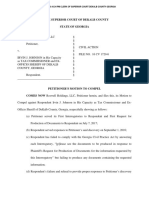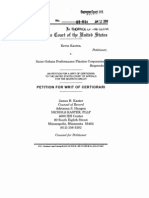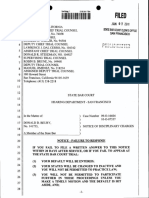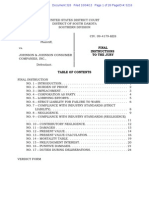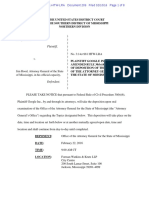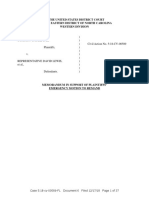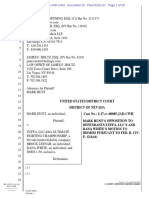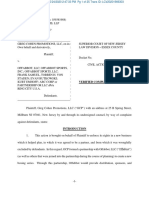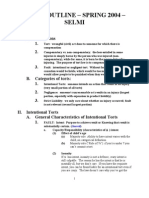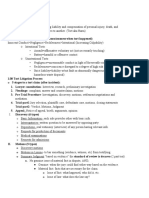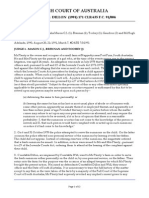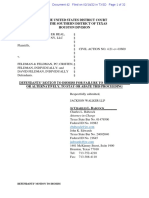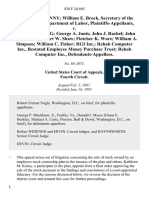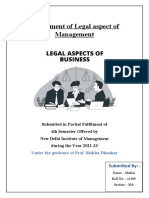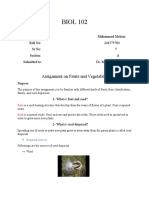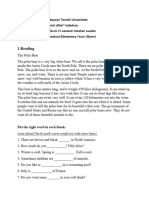491
LGST 101 PROBLEMS:
CONSIDERATION
1. Cardoza threatened to sue Pereira for $960 which Pereira owed
Cardoza. In order to dissuade Cardoza from this course of
action, Pereira presented to Cardoza a promissory note made by
Marshall to the order of Cardoza. Upon non-payment of the note
at maturity, Cardoza sued Marshall. Marshall's defense was that
no consideration moved from Cardoza, the promisee in the note, to
him the promisor. Will Cardoza recover?
2. Towne ordered a shipment of Coffee from Brazil. The coffee
was due to arrive shortly in New York and he expected to sell it
for a profit. He entered into an agreement with Neely whereby
they mutually promised to share equally the profits and the
losses realized in the venture. Towne paid $2000 for the coffee,
but was unable to sell it for more than $1000. Neely refused to
abide by the agreement . and Towne sued him to recover $500.
Defense: No consideration. Judgment for whom?
3. Mack, a builder, made a contract with West to build an
addition to West's home for $8000. Mack agreed to complete the
work within four months. At the end of one month Mack told West
that he was about to discontinue the work because he could not
employ men at eight dollars a day as he had planned. West was in
a hurry to have the work completed, and agreed in writing with
Mack to pay one-half extra labor cost if Mack would continue to
work. Mack employed the men he needed at ten dollars a day, and
finished the work on time. West refused to pay more than the
original contract price of $8000. Mack sues to recover one-half
Should
the extra labor cost. Defense, lack of consideration.
Mack recover? Discuss fully.
This document is authorized for use by Krishnan Sethumadhavan, from 8/10/2015 to 12/15/2015, in the course:
LGST 101: 006 Introduction to Law and Legal Procedure - Constan (Fall 2015), University of Pennsylvania.
Any unauthorized use or reproduction of this document is strictly prohibited.
�493
LGST 101 PROBLEMS:
OFFER
1. On August 18, 1959, the Nursery Co., Inc. of La Feria, Texas,
entered into a written agreement with H. L. Engel, Inc. of
Edenburg, Texas, under the terms of which the Nursery Co. agreed
to supply "50,000 citrus fruit trees to be selected as to
variety, on or before October 1, 1959, by the buyer, said trees
to caliper at time of delivery five-eight inches or larger and
said trees to be from seedings now growing of seller's nursery."
The price was to be $1.70 per tree, delivery to be between
December 1, 1960 and April 1, 1961. On September 15, 1959 H.L.
Engel, Inc. ordered the following citrus trees: 2500 Norris
oranges, 2000 Temple oranges, 2000 Davey tangerines, 2500
Valencia oranges, 2000 Pineapple oranges, 5000 Marsh Pink
oranges, 1000 Washington Navel oranges and 33,000 Marsh Seedless
oranges. All of these were in seedling form at the seller's
nursery. The Nursery Company refused to perform the agreement,
upon the ground that it was indefinite as to subject matter,
since the particular kinds of trees and the amount of each kind
were not specified in the agreement. Is the contention of the
Nursery Company sound? Explain.
2. Should a court find that there is the requisite mutual assent
if the response to the following is "I accept"?
a)
b)
c)
d)
"I'm considering selling my car to you for $1200."
"I will sell you my car for $1200."
"Would it be a good deal if I sold my car for $1200?"
"You wouldn't consider paying $1200 for my car, would
you?"
3. John Falstaff bought a new car for $15,000, but the first day
he drove it to work it broke down on the highway and stranded
him. John finally managed to get to his neighborhood bar where
he loudly trumpeted his disgust with the car. When the busboy,
Francis Feeble, who was known by all to have a very low I.Q.,
said, "I love your new car," John raised his stein of beer and
toasted Francis, replying, "It's yours for $1,500 -- just go get
it." Francis said, "Thanks, Mr. Falstaff, I'll do it now and pay
you this evening." Everyone in the tavern laughed as Francis
rushed off to rescue the car.
Later that day, after Francis had the car towed to his home,
Francis showed up at the bar where John was still consoling
himself and put $1,500 on the counter in front of John. When
John asked, "What's this?" Francis explained that it was the
payment for the car. John refused to take the money, saying that
of course he had not been serious earlier in the day. Is Francis
entitled to the car in your opinion?
4. At a legislative committee hearing, Walter Mitty, a lobbyist
for consumer interests, stated: "If the banks are not willing to
This document is authorized for use by Krishnan Sethumadhavan, from 8/10/2015 to 12/15/2015, in the course:
LGST 101: 006 Introduction to Law and Legal Procedure - Constan (Fall 2015), University of Pennsylvania.
Any unauthorized use or reproduction of this document is strictly prohibited.
�494
lend money at the currently permissible interest rate, that is
not good business. The rates are high enough. I am willing to
lend money at the present rate of interest." Edith Taylor saw a
report on the committee meeting and heard Mitty make his
statement on the evening news. She called him and demanded a
loan at the then permitted interest rate. Contract?
5. U. N. Owen was a fanatical bridge player. Once a year he
invited a number of people to his remote home on Island for a
weekend of nonstop bridge. He sent the invitations two months in
advance and followed them with phone calls to make sure everybody
was really going to come. One of the guests, a retired jurist
named Justice Wargrave, assured Mr. Owen that he would make the
journey, but backed out at the last minute and went to a pinochle
tournament instead. When the guests arrived at the island, Owen
was dismayed to find that he did not have enough people for the
complicated bridge tournament he had planned, so he canceled the
entire weekend and sent everyone home. He then sent Wargrave a
bill for $2,750, the expenses he had undergone in setting up the
weekend. Must Justice Wargrave pay?
6. Beaumont and Fletcher signed a contract agreeing to each put
up $50,000 for a theatrical performance that they were to write
themselves. The five page, single-spaced contract contained this
clause:
This contract shall not be enforceable in a court of law.
When Beaumont refused to contribute his share of the money or
attend any writing sessions, Fletcher sued. Does the quoted
clause strip the court of jurisdiction?
This document is authorized for use by Krishnan Sethumadhavan, from 8/10/2015 to 12/15/2015, in the course:
LGST 101: 006 Introduction to Law and Legal Procedure - Constan (Fall 2015), University of Pennsylvania.
Any unauthorized use or reproduction of this document is strictly prohibited.
�495
LGST 101 PROBLEMS:
ACCEPTANCE
1. Hawley owned a Buick, and occasionally had work done on it at
the Hoff Garage. One day he drove up with a flat tire, parked
his car beside the garage, and called to Hoff that he had a flat
Hawley
tire and would be back in an hour. Hoff fixed the tire.
refused to pay, saying that he had intended doing the job
himself. (a) Was there a contract? Explain. (b) Suppose Hoff
also adjusted the carburetor and straightened a fender. Could he
recover for this?
2. Without prior solicitation, plaintiff sent to defendant,
manufacturer of Chesterfield cigarettes, a letter in which he
submitted what he called "an original advertising scheme" for
billboard advertising. The idea consisted of a picture of "two
gentlemen, well groomed, in working clothes or in hunting togs,
apparently engages in conversation, one extending to the other a
package of cigarettes Saying, 'Have one of these,' and the other
replying, 'No thanks; I smoke Chesterfields." In his letter
plaintiff stated that he trusted, "this idea will be of
sufficient value to merit a reasonable charge therefor."
Defendant did not reply, but subsequently advertised a picture of
two men and a caddy with golf clubs, one man having an open
cigarette case, and the other with a package of Chesterfields,
and the slogan "I'll stick to Chesterfields." Plaintiff sued for
$25,000. The jury found that defendant's advertisement was based
directly on plaintiff's letter. Assuming that plaintiff had a
property right in the idea, as the court decided he had, is
plaintiff entitled to recover on the basis of contract or on any
other basis? Explain.
3. Cooper, a tenant whose lease was about to expire, wrote to
Springer, the landlord, proposing to rent the land for a new
period on the same terms. Springer answered by letter, "I expect
to be in your county early next week. If I do not call or
communicate further with you in the course of a few days, you can
count on having the land. But this year I am obliged to raise
the rent to $125 a month instead of $110 as per the current lease
about to expire." Cooper heard nothing further from Springer,
and after a week had passed, Cooper proceeded to plow and plant
his wheat. Springer sues Cooper for the rent as stated in this
letter. Can he recover? Explain.
4. On March 2, 1971, Fredericks, a wholesaler in eggs,
telegraphed Stevens, a farmer: "Am in the market for 10,000 dozen
white leghorn eggs at 20 cents a dozen, delivery to be on March
7, next. Will buy all that you have of that kind on hand at
present time, provided not more than 3 days old, up to 10,000
dozen." Stevens, without replying, on March 6, shipped 5,000
dozen white leghorn eggs, which arrived on March 7. Fredericks
immediately notified Stevens that he had purchased all his eggs
This document is authorized for use by Krishnan Sethumadhavan, from 8/10/2015 to 12/15/2015, in the course:
LGST 101: 006 Introduction to Law and Legal Procedure - Constan (Fall 2015), University of Pennsylvania.
Any unauthorized use or reproduction of this document is strictly prohibited.
�496
elsewhere. Stevens sold the eggs to Johnson, and took a 5 cents
loss per dozen. He now sues Fredericks for $250, alleging breach
of contract. Judgment for whom and why?
5. On October 15, Webb, in New York City, wired Cushing, in
Scranton, as follows: "I offer you 100 shares Garnett
Incorporated stock at $211 each. I suggest you answer by Air
Mail today, because I must know your answer by 10 o'clock
tomorrow morning." Cushing immediately upon receipt of Webb's
offer sent a reply by Air Mail accepting the offer, depositing
his letter in the Scranton Post Office at 3 o'clock, October 15.
This letter, in the normal course, should have reached Webb by 9
o'clock the following morning. Unknown to either party the
airplane carrying the mail was delayed, and Cushing' letter did
not reach Webb until 12 o'clock, October 16. In the meantime
Webb had sold the stock at 11 o'clock, October 16. Cushing
brings suit against Webb for breach of contract. Can he recover?
Explain.
6. Archie Goodwin signed a purchase order for a new car to be
sold by Wolf Motors. The purchase order stated that $800 would
be deducted from the price as a trade-in allowance on his old
car. When he delivered the old car, Rex Stout, Wolf's sales
manager, told him that a mistake had been made and that the car
was only worth $600. Stout stated that Wolf Motors would not go
though with the deal unless Goodwin agreed to this reduction.
Goodwin sued. How should this come out?
7. When
several
Speed a
the job
Thurio decided to remodel his den he asked for bids from
woodworkers before selecting Lance Speed. Thurio sent
letter containing the news and added, "If you agree to do
under the quoted terms, start work immediately."
a) Does the acceptance occur when Speed begins work or is
something further required? Is UCC 2-206(2) applicable here?
b) Speed sent no formal reply to Thurio. Instead on Monday
he phoned the lumberyard with an order for wood that was
identical to his usual weekly order. Nonetheless, Speed will
testify that he ordered this wood for Thurio's job, and that he
always orders the same amount of wood each week planning on
getting enough work that week to justify the order (he is a very
popular carpenter).
On Tuesday morning, in contemplation of the Thurio project,
he sharpened his tools. At one o'clock in the afternoon, he got
out his plans of the project and began making detailed notes.
Assume that Thurio changes his mind late Monday night and
decides to scrap the remodeling. If he phones a revocation of
his offer, at what moment will it come too late? That is which,
if any, of Speed's actions was sufficient as an acceptance?
8. In the beginning of their commerce, the Mikado Manufacturing
Company and the Ruddigore Retailer had done business on a formal
basis agreeing among other things that all items were delivered
for immediate purchase at the invoice price. Eventually the
This document is authorized for use by Krishnan Sethumadhavan, from 8/10/2015 to 12/15/2015, in the course:
LGST 101: 006 Introduction to Law and Legal Procedure - Constan (Fall 2015), University of Pennsylvania.
Any unauthorized use or reproduction of this document is strictly prohibited.
�497
parties stopped using formal contracts. A five-year period of
extensive dealings was followed by a slack period of one year in
which they had no dealings. Then suddenly, Mikado Manufacturing
sent Ruddigore a shipment of its latest product line along with a
bill for $8,000. If Ruddigore objects immediately, must it pay?
What if it says nothing, but one week later sends Mikado
Manufacturing a letter objecting to the shipment? Suppose
instead that Ruddigore says nothing, but immediately resells the
goods to another company. Is this an acceptance?
9. Reginald Bunthorne was considerably annoyed to receive in the
mail a copy of a new magazine Country Music Today. He liked only
classical music. The cover letter with the magazine stated that
he was being sent a 12-month subscription for only $18, and that
if he didn't want this fabulous limited offer he should return
the enclosed card ("Please attach postage, the post office will
not deliver unstamped letter," he was told by the envelope).
Bunthorne threw the magazine away after a hurried reading
confirmed his worst fears. He threw eleven more issues away too
before the bill for $18 arrived. He then threw it away, and
eventually the magazine threatened suit. At a cocktail party,
Bunthorne asks you for a free bit of legal advice about his
contractual liability.
10. Hannibal Hamlin ran a business concern that produced cheap
cigars. One day he received in the mail the following purchase
order:
August 18
Dear Mr. Hamlin:
I hereby offer to purchase 42 cartons of your West Coast
cigars at $200 a carton, shipment to be made F.O.B. truck your
plant by September 25th. If acceptable, please write me
immediately.
/s/ Thomas R. Marshall
Now read UCC 2-206 and decide which of the following
responses create a contract.
a) Hamlin telephoned Marshall and said, "I accept".
b) Hamlin telegraphed Marshall with the same message.
c) Hamlin shipped the cigars on August 15th without prior
agreement, though he immediately sent Marshall a telegram
notifying him of the shipment (see UCC 2-504). If the cigars
are defective (they explode, say, or are infected with a
pesticide), can Hamlin escape liability by arguing in this way:
the buyer only offered to buy a product that was usable as a
cigar, but the cigars I sent did not conform to this offer so no
"acceptance" arose and there is no "contract" between us?
d) You are Hamlin's attorney and he phones you with this
dilemma: Marshall's letter asked for "West Coast cigars," but
Hamlin is all out of that brand. He has a slightly different
brand on hand ("East Coast") and he would be willing to sell them
for the price Marshall quoted, but he cannot get in touch with
Marshall to get approval of the change. If he ships the goods,
This document is authorized for use by Krishnan Sethumadhavan, from 8/10/2015 to 12/15/2015, in the course:
LGST 101: 006 Introduction to Law and Legal Procedure - Constan (Fall 2015), University of Pennsylvania.
Any unauthorized use or reproduction of this document is strictly prohibited.
�498
will he be in breach? Is there any language he should add to the
invoice or cover letter to protect himself? See UCC 2-206(1)(b).
Was this a request for "prompt shipment"?
This document is authorized for use by Krishnan Sethumadhavan, from 8/10/2015 to 12/15/2015, in the course:
LGST 101: 006 Introduction to Law and Legal Procedure - Constan (Fall 2015), University of Pennsylvania.
Any unauthorized use or reproduction of this document is strictly prohibited.
�499
LGST 101 PROBLEMS:
REVOCATION OF OFFER
1. Hoover Motor Express Company sent a written offer to purchase
certain real estate to Clements Paper Company. Prior to
accepting the offer, the vice-president of Clements phoned Mr.
Hoover to discuss some details of the transaction. He was very
surprised to hear Mr. Hoover say, "Well, I don't know if we are
ready. We have not decided; we might not want to go through with
it." Clements's VP wrote Hoover Motor and accepted the offer as
soon as he hung up the phone. Hoover Motor responded that the
acceptance came after the revocation and was therefore too late.
Who prevails? Is it good policy to hold for the offeror here?
2. A says to B., "I will give you $100 if you walk across the
Brooklyn Bridge." B starts to walk across the Brooklyn Bridge
and has gone about one-half the way across. At that moment A
overtakes B and says to him, "I withdraw my offer." Has B them
any rights against A? At what moment will B have made an
"acceptance"? Is it also right to use that as the moment that
terminates A's power of revocation?
3. Three Pigs Restaurant hired Wolf Construction Company to put a
new roof on the building, agreeing to pay Wolf $4,000 "on
completion." Wolf quit the job when it was half-way done,
leaving Three Pigs with a mess to clean up (a second contractor
charged $5,000 for finishing the job). Three Pigs sued Wolf for
its damages. Can Wolf defend by arguing that it had never made
an acceptance? What, if any, is the moment of acceptance here?
4. Pecos Bill wanted to buy some logging equipment owned by Paul
Bunyan, and they negotiated for some time. Finally Paul
submitted a proposal to Bill stating, "I hereby give you the
option to purchase this equipment for $12,000, the option to
expire on Friday at noon unless exercised." Bill paid nothing
for the option. On Friday at 11:00 a.m. he showed up at Paul's
office but before he could tender the money, Paul said, "I
revoke."
a) At common law, who prevails? What should Bill have done?
b) Suppose that Paul Bunyan is a logger but that he does not
normally sell logging equipment. If the UCC applies, does 2-205
(the "Firm Offer Rule") change the result?
c) Assume that the Uniform Commercial Code applies to this
problem and that Paul Bunyan, a logger, is selling logs to Pecos
Bill. If he makes the same written offer to Bill, who again pays
nothing for the option, could Paul revoke prior to Friday at
noon?
d) If the offer stated that it would be held open for six
months, would Paul be bound for that entire period?
5. Newman-Money Department Store wanted to buy 500 pairs of
rainboots for a special sale. Newman-Money's buyer phoned Shoe
This document is authorized for use by Krishnan Sethumadhavan, from 8/10/2015 to 12/15/2015, in the course:
LGST 101: 006 Introduction to Law and Legal Procedure - Constan (Fall 2015), University of Pennsylvania.
Any unauthorized use or reproduction of this document is strictly prohibited.
�500
World, a manufacturer, and asked for a quotation. Shoe World's
sales manager said, "We will sell you the 500 pairs for $10,000
and guarantee that we will hold this offer open until next
Monday." Shortly after the phone call ended, Shoe World learned
it could sell the boots elsewhere at a greater profit. It phones
you, its attorney, and asks if it can revoke its offer to NewmanMoney. Look at UCC 2-205 and decide.
6. Alphonse and Gaston met on the street one day. Alphonse said,
"I have long wanted to buy the painting you have hanging in your
dining room. I offer you $800 for it." Gaston replied, "Well,
I'm not sure I want to sell it. I'm very fond of that painting."
The conversation drifted on to other matters, and eventually they
shook hands and parted. The next day Gaston decided that he
wasn't as fond of the painting as he was of having $800 so he
phoned Alphonse and accepted the offer. The latter retorted that
there was no deal and he refused to pay the $800. If Gaston
sues, who should win here? If in the original conversation
Alphonse had said, "I'll give you until tomorrow at noon to make
up your mind," could Gaston have accepted the next day at 5:00
p.m.? At 1:00 p.m.? Would it make any difference if Alphonse
were hard to find the next morning?
7. Zorba wrote Nikos and offered to be his guide for a summer
tour of Greece, stating a price for his services and adding that
he would leave this offer open until April 30. On April 9th,
Nikos wrote back that he was "not interested," but the next day
his plans changed and he decided to take the tour. He
immediately wrote Zorba and accepted the offer. Zorba however
was outraged by the first letter and he refused to act as Nikos's
guide. Nikos consults you. Does he have a contract or not?
Would you answer change if Nikos had purchased an option
that allowed him to retain Zorba's services at a fixed price
until April 30?
If Nikos had replied that he would employ Zorba, but at a
lower price than Zorba proposed, would this counteroffer also be
a rejection and terminate his power of acceptance?
If Nikos responds that he is considering Zorba's offer, but
in the meantime would like to propose that the tour include
Turkey as well as Greece, with an appropriate adjustment in the
price of Zorba's services, is this counteroffer also a rejection?
8. On March 1, 1972, the Clay Products Company wrote Potter
offering to supply up to five million bricks at the rate of $28
per thousand, and expressly agreeing to keep the offer open until
May 1. On April 1 the Clay Products Company wrote Potter
withdrawing their proposition and he received this letter on
April 2. On April 3 Potter wrote the Clay Products Company
stating that he accepted their proposition and denouncing their
attempt to withdraw the offer, inasmuch as they had given Potter
two months in which to accept. When called upon to deliver the
bricks, Clay Products Company refused to do so and Potter sued.
Decide and explain.
This document is authorized for use by Krishnan Sethumadhavan, from 8/10/2015 to 12/15/2015, in the course:
LGST 101: 006 Introduction to Law and Legal Procedure - Constan (Fall 2015), University of Pennsylvania.
Any unauthorized use or reproduction of this document is strictly prohibited.
�501
9. Well Oil Co. offered to sell Vincent a parcel of land in a
distant state at a certain price. Vincent said he would like to
examine the property to see if it was as represented. The Well
Oil Co. agreed to give Vincent ten days to make the examination.
Within the ten-day examination period and while Vincent was
examining the property, Well Oil Co. advised him that it would
sell the land only for an advanced price, which was considerably
higher than the price mentioned. After making an examination at
considerable expense Vincent decided to take the land on the
terms first stated and notified Well Oil Co. within the ten-day
period that he accepted those terms. The Well Oil Co. refused to
convey the land. Vincent sued Well Oil Co. for damages. Can
Vincent recover? Explain.
10. Without receiving any consideration from plaintiff, defendant
delivered to plaintiff a memorandum signed by defendant in which
he offered to sell plaintiff a described parcel of real estate
and agreed to keep the offer open for two days. On the morning
of the first day plaintiff decided to accept the offer, but did
not at once signify his acceptance because he believed that he
had the power to accept the following day. On the afternoon of
the first day, plaintiff was informed by a trustworthy source
that defendant had contracted to sell the property to a third
party. This was true. Nevertheless, plaintiff located defendant
early the second day and handed tom him a written acceptance of
the offer. Defendant responded by stating that plaintiff was too
late because he, defendant, already had sold the property.
Plaintiff brought a bill in equity praying that defendant be
required to perform the alleged contract and restrained from
conveying the property to the third party to whom he had
contracted to sell it. Decide and explain, stating the arguments
that reasonably might be made by each of the parties.
This document is authorized for use by Krishnan Sethumadhavan, from 8/10/2015 to 12/15/2015, in the course:
LGST 101: 006 Introduction to Law and Legal Procedure - Constan (Fall 2015), University of Pennsylvania.
Any unauthorized use or reproduction of this document is strictly prohibited.
�503
LGST 101 PROBLEMS:
REMEDIES
1. Siros owned a "Guarnerius", a rare violin made by Guarneri in
1705. He entered into a contract whereby he promised to sell and
Lister promised to buy the instrument for $20,000. Lister
subsequently refused, without legal cause, to abide by the
contract. Siros set the violin up for sale at public auction and
gave Lister due notice of this fact. Lister was also advised of
Soros' intention to bid at the sale. The sale was properly
advertised and fairly held and was well attended by collectors
and musical authorities. Siros was himself the highest bidder,
at $15,000. Siros then sued Lister to recover $5,000. Decide.
2. Maris Construction Co. agreed to build a house for Lee in
accordance with certain specifications. The price stipulated was
$45,000. The contract provided that the house was to be
completed and ready for occupancy June 1, 1960. The
construction company wrongfully refused to perform and repudiated
the contract before anything was done thereunder. Lee, after
some trouble, located another contractor who built the house,
according to the same specifications, for $53,000. The house was
built and completed on September 1, 1960. Lee then sued Maris
Construction Co. to recover damages for breach of contract. What
is the measure of damages recoverable by Lee?
3. Osburn, who owned certain timber land, contracted to cut,
peel, haul, and deliver all the hemlock bark upon his lands to
the Elk Tanning Co., which owned a tannery in the vicinity.
Subsequently Osburn attempted to sell the bark from his land
elsewhere, and the Elk Tanning Company filed a bill in equity
paying for specific performance, and alleging that it was
necessary for them to have this bark for tanning, that the supply
of such bark was limited, and that the loss of it would cause
irreparable injury to the company, which had erected the tannery
at great expense. The defendant, Osburn, objected that
plaintiffs had an adequate remedy at law. Should a decree
ordering specific performance issue?
4. Joseph and Pauline Shore conceived the idea of securing a
concession to operate a drug store in Union Station, Washington,
D.C. They approached Sixsmith with the proposition that he
assist them in the venture. Sixsmith was to have a 60 percent
interest in the enterprise while the interest of the Shores was
to be 40 percent. If this lucrative concession were granted, a
corporation was to be formed. After considerable difficulty the
concession was granted and the Union Drug Company incorporated.
Sixsmith refused to issue to the Shores their stock interest.
They brought an action for specific performance. Sixsmith
claimed that they should have sued for damages. Will the Shores
be successful?
This document is authorized for use by Krishnan Sethumadhavan, from 8/10/2015 to 12/15/2015, in the course:
LGST 101: 006 Introduction to Law and Legal Procedure - Constan (Fall 2015), University of Pennsylvania.
Any unauthorized use or reproduction of this document is strictly prohibited.
�504
5. Maluvius operated a grocery store in Glassboro, New Jersey,
and sold to consumers throughout Glassboro. He sold the business
to Bloomfield and agreed, as part of the consideration for the
contract of sale, not to engage in the grocery business in
Glassboro for five years. Two years later Maluvius opened in
Glassboro a new grocery store in competition with Bloomfield, who
sued to obtain an injunction against Maluvius. Will the
injunction be granted?
6. Daroff and Vitullo of Philadelphia made a contract whereby
Vitullo agreed to tailor a minimum of 1000 overcoats per week for
a period of a year on specified terms and at certain prices,
Vitullo agreeing that he would not do any tailoring work for any
other person during the term of the agreement. Vitullo broke the
agreement and entered into a contract to tailor garments for a
competitor of Daroff. Daroff brought suit in equity to restrain
Vitullo from tailoring garments for others during the term of the
original contract. It appears that Vitullo possessed the only
establishment in Philadelphia at this time capable of handling so
large a contract. Is Daroff entitled to a decree restraining
Vitullo?
7. Roderick Murgatoyd had always thought his family house was
worth little because it was so old, and therefore he was
surprised when Rose Maybud offered to buy it from him for
$80,000. He signed the contract with her immediately. As he
finished signing, he asked her why she was willing to pay so much
for the property, and she replied, "Because it's worth twice the
amount you have just sold it for, and I plan to retire on the
profit I'll make when I resell." Astounded, he tore up the
contract and told her that he was not going to sell her the
property. When she sues, what damages should she ask for,
considering that she never paid him a cent (though the property
is worth $150,000)? Does the fact that she has paid nothing and
has in no way relied on this contract furnish him with a defense?
8. Helen's Contracting agreed to build a huge horse for the town
of Troy's annual pioneer parade. Helen agreed to build the horse
for $24,000. It was going to cost Helen $20,000 to build the
horse. After three months work and the expenditure of $15,000,
the horse was three-fourths completed. On that date the town of
Troy told Helen to stop construction on the horse. Troy had
already paid Helen $5,000 but refused to pay any more. Helen can
sell the horse for $2,000 salvage value. What is the loss in
expectation value to Helen?
9. Rogette began drafting the fourteenth edition of her tour
guide pursuant to an agreement with White Publishing. After
Rogette was one quarter done, White repudiated the agreement.
Rogette sued White for the amount of money she had expended on
the book to the time of the repudiation. She also sued White for
the "expectancy", that is, the total amount she expected she
would have earned (royalties) on the book. White admits
liability but alleges the damages should be measured either by
This document is authorized for use by Krishnan Sethumadhavan, from 8/10/2015 to 12/15/2015, in the course:
LGST 101: 006 Introduction to Law and Legal Procedure - Constan (Fall 2015), University of Pennsylvania.
Any unauthorized use or reproduction of this document is strictly prohibited.
�505
the expectancy or the amount spent but should not include both.
Rogette argues that she had suffered the loss of both elements of
damages and should receive both. Who is right?
This document is authorized for use by Krishnan Sethumadhavan, from 8/10/2015 to 12/15/2015, in the course:
LGST 101: 006 Introduction to Law and Legal Procedure - Constan (Fall 2015), University of Pennsylvania.
Any unauthorized use or reproduction of this document is strictly prohibited.
�507
LGST 101 PRoBLEMS:
LIMITATIONS ON REMEDIES
1. Bill Gilbert was offered $50,000 for his new play Engaged if
he could get it to the producer, Dick Carte, by October 12. He
finished writing the play on October 10, and called up a private
courier. Overnight Delivery, Inc., telling the woman he talked
to on the phone all of the above details. He ended the
conversation saying, "I'll lose $50,000 if this package does not
arrive by October 12." She told him not to worry. The Overnight
Delivery courier picked up the package on October 11, and put it
on board its airplane for delivery the next day. That night the
plane crashed, and the package was never delivered. Gilbert's
play was not produced, and he sued Overnight Delivery, Inc. for
$50,000. Are either of the following defenses valid?
a) Mere knowledge of the possible damages flowing from the
breach is not the same thing as an agreement to accept the
liability for such damages. Before the liability attaches, there
must be at least a tacit agreement under which the defendant
assumes the risk of the consequential loss.
b) The plain crash was totally unforeseeable, so that
Overnight Delivery is not liable for the consequential damages.
2. On graduating from law school, Andrew Advocate received a gift
of $20,000 from his wealthy parents and used it to buy a sports
car that he had long desired. The car proved to be a lemon; four
times it stalled and stranded Andrew in dangerous situations. He
took time off from his new job 18 times to take the car to and
from the dealer's repair shop. Finally when it stalled for the
fifth time and made him miss a court appearance, he parked the
car at the dealership, and gave notice that he was revoking his
acceptance. When the dealer ignored him, he sued, asking for a
return of his purchase money plus consequential damages of $5,000
for "mental anguish". Is this last element of damages
recoverable?
3. For the Cleveland World's Fair, Balloons of America had
contracted with the government of Cuba to build a giant balloon
in the shape of a cigar. It was halfway finished when Cuba
decided to abandon a project. Balloons of America phones you,
its attorney, and wants to know whether it should complete the
cigar-shaped balloon (contract price: $13,000), or stop now (when
it has expended only $8,000) and sell the partially completed
balloon for its scrap value ($120). The cost of completion is
$2,500 and the salvage value after completion is $1,000.
4. Hearing a report that Alice Chalk, a popular high school
teacher, was a drug dealer on the side, the school's principal
marched down to her classroom and fired Alice on the spot. Her
horrified students' jaws dropped open when the principal accused
her of selling drugs and ordered her from the building. Later
This document is authorized for use by Krishnan Sethumadhavan, from 8/10/2015 to 12/15/2015, in the course:
LGST 101: 006 Introduction to Law and Legal Procedure - Constan (Fall 2015), University of Pennsylvania.
Any unauthorized use or reproduction of this document is strictly prohibited.
�508
that day, the principle learned that the report was false and he
phoned Alice at home, apologizing, and offered her job back. She
declined, and took a job as an evening waitress in an all-night
diner. She also sued the school for wrongful termination. Is it
a defense that she refused to return to her job? Is the salary
she receives as a waitress a mitigating factor? What if she had
accepted unemployment compensation?
6. Booth invented a certain rail cap, to be used by railroad
companies along their rights of way. He contracted to supply the
Lehigh Valley Railroad Company with a certain number of rails
equipped with the above caps for $100,000. The Speyton-Day Mill
Company, knowing of Booth's contract with the railroad, agreed to
manufacture the caps for Booth for $10,000. The mill in which
the caps were to be made burned. Booth could have obtained them
elsewhere at a cost of $12,000, but did not. As a result he lost
a $5,000 profit on his Lehigh Valley contract. In an action by
Booth against the Mill Company how much, if anything, will Booth
recover?
This document is authorized for use by Krishnan Sethumadhavan, from 8/10/2015 to 12/15/2015, in the course:
LGST 101: 006 Introduction to Law and Legal Procedure - Constan (Fall 2015), University of Pennsylvania.
Any unauthorized use or reproduction of this document is strictly prohibited.
�509
PRACTICE PROBLEMS-Legal Studies 101
Jack and Jill have done business together for years. Jill is
a professional landscaper and Jack sells lawn and garden tools.
One day Old King Cole put the following advertisement in the
Nursery Rhyme News: "Attention! I will pay $100,000 to the first
person able to make flowers grow on the shady side of my hill.
[After which was a description of the location of the hill.]"
Jill saw the ad and immediately remembered that Jack sells
hybrid tulips that require no sunlight. Jack is the only dealer
in Nurseryland that sells these tulips. Jill rushed over to
Jack's store. When she got there Jack was helping other customers
but Jill saw the hybrid tulips. She left Jack the following note:
"Dear Jack: Here's $20; I took two dozen hybrid tulips but I need
2 dozen more. Please get them for me. I will pay you the usual
$10 a dozen. Thanks, Jill."
Boy Blue saw the same ad in the newspaper. He goes to Jack's
store that afternoon, tells him about the ad and asks if Jack has
any flowers that he could use. Jack remembers his tulips. When he
goes to get the tulips he sees Jills note. He reads it and puts
it in his pocket. Jack tells Boy Blue that he is out of the
tulips right now but is expecting another shipment tonight.
"Great" says Boy Blue. I'll pay you $20 a dozen for 2 dozen.
"Okay" says Jack.
The shipment comes but it is only 2 dozen tulips.
1. Assume Jack sells the tulips to Jill. The only other tulips
are in Sesame Street and they cost $30 a dozen plus
transportation. Can Boy Blue sue Jack for breach of contract. If
so, what are his damages?
2. Assume Jack sells the tulips to Boy Blue. Furthermore assume
that Boy Blue won the money because he was the first to make
flowers grow on the hill. Can Jill sue Jack? If so, what are her
damages? Does Jack have any defenses?
3. Assume Jill finds out about the tulip delivery before Jack
sells them to Boy Blue. What factors are important in her request
for specific performance.
4. Assume Jack sells the flowers to Jill. Jill shows up at Old
King Cole's hill ready to plant. If King Cole says he was only
kidding make a case for Jill to sue for breach of contract.
5. Again Jack sell tulips to Jill. King Cole's horses and men
keep Jill away from the hill so that she cannot plant the
flowers. In defense of the breach of contract suit Jill brings
against the King he states that this was a unilateral contract
that could only be accepted by performance. Analyze the strength
of this argument.
This document is authorized for use by Krishnan Sethumadhavan, from 8/10/2015 to 12/15/2015, in the course:
LGST 101: 006 Introduction to Law and Legal Procedure - Constan (Fall 2015), University of Pennsylvania.
Any unauthorized use or reproduction of this document is strictly prohibited.







